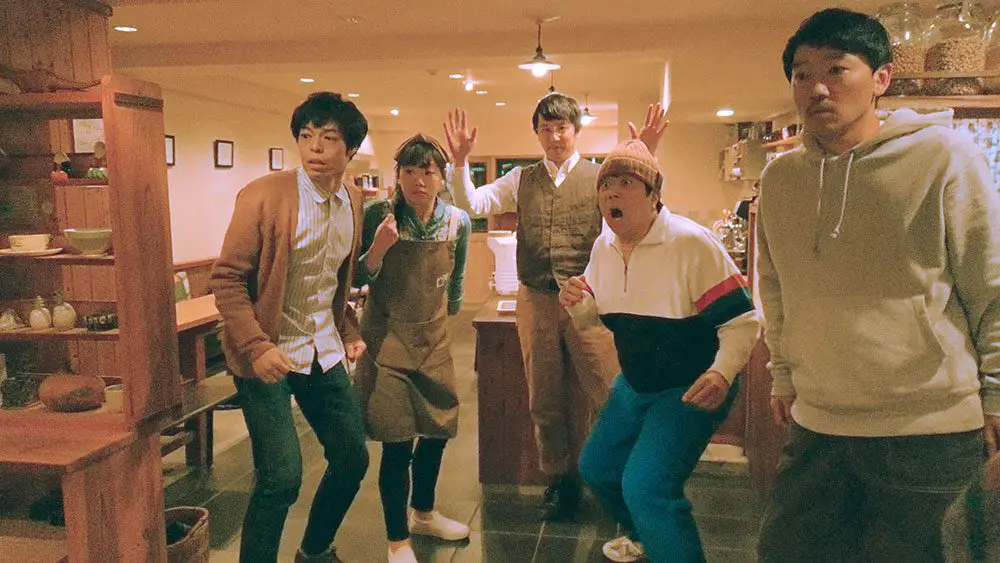Kato (Kazunari Tosa) owns a modest city café, but what little energy he has is directed towards playing a guitar. His apathy has a double take one evening when he discovers that the monitor in his room above the café shows what the TV downstairs picks up two minutes later. And how does he discover this? Kato himself—two minutes older—tells him via the monitor. This unassuming little paradox sets the scene for Beyond the Infinite Two Minutes, a light comedy, a high-concept sci-fi, a hopeful romance and a philosophical treatise all in one. It’s only seventy minutes long, features a drama troupe playing their first film roles in most cases and was shot on an iPhone with no visible cuts.
Kato is very wary of anticipating—let alone seeing—the future, but first his employee Aya (Riko Fujitani) and then three of their friends and customers get wind of the “Time TV”. Komiya (Gota Ishida) and Tanabe (Masashi Suwa) just want to play around with the discovery, while Ozawa (Yoshifumi Sakai) approaches it with more intellect and Aya with wonder. In any case, Kato no longer has any control or ownership once others get involved, but finds himself obliged to step up again when the experiments put his lovely neighbour Megumi (Aki Asakura) at risk.
Beyond the Infinite Two Minutes is a fast paced film, so much so that no-one is permitted the time to deny what their eyes can see is happening, nor pause to hunt for explanations: this window into the future just is. Some of the characters describe what is happening (one with gestures, one with a chalkboard and one with a brief lecture), but no-one ventures to speculate as to why or even how it is happening. The fact that the future they can see is only two minutes away means they have to think fast to get any value out of the experience; but there also may be an element of the why and how being too vast to contemplate. When they stretch that two minute view by placing the two devices to face each other, there is a real sense that they are getting out of their depths, but that the situation is way too exciting to worry about any kind of risk assessment.
Makoto Ueda wrote Beyond the Infinite Two Minutes and I’m frankly in awe. I have no idea how he could draft a story both simple and convoluted at the same time; possibly with a series of diagrams. The pace of the film changed smoothly, and yet unexpectedly here and there: at first, as the characters figured out how to make use of this “Time TV”, the viewer is treated to the same conversation from two or three different perspectives. This does seem somewhat repetitive at the time, though it does bring humour with it (in a similar way to seeing the scenes in One Cut of the Dead from its various perspectives). As more people become involved, it naturally turns chaotic; and as some unintended people become involved, the chaos settles into suspense.

What’s most impressive about the writing is how different characters’ personalities feed into the story; and into such a concise story at that. The very concept of the future can be daunting or exciting to different people; and Kato, for example, had apparently grown up with fear for the future. At one point (when he can actually be heard), he confides that he’s tired of being ruled by the future, and feels betrayed by it too; so it’s especially understandable that it hurts him to tell a lie to his past self.
Then there’s the philosophical aspect to the film, hinted at by the other titles that Beyond the Infinite Two Minutes is known by: We are at the end of Droste, Dorosute no hate de bokura, Droste’s End. The Droste effect “is the effect of a picture recursively appearing within itself, in a place where a similar picture would realistically be expected to appear, creating a loop which theoretically could go on forever”; and the view of the café from past to future via repeating device screens can potentially be infinite too. It’s mesmerising—to look at and to think about—and such a view of time creates a feeling that one’s future is set: if you can see it, it’s clearly going to happen.
Beyond the Infinite Two Minutes was directed by Junta Yamaguchi (also responsible for cinematography and editing), and I can imagine that it must have been great fun, but also like managing a small scale but very precise military campaign: everything planned and conducted precisely. I wish I could reassure Kato (with a favourite T2 line) that “the future is not set. There’s no fate but what we make for ourselves.” My future includes the purchase of the Beyond the Infinite Two Minutes Blu-ray when it is released in November, not least so I can watch the making-of interview with Yamaguchi.
Beyond the Infinite Two Minutes has its North American premiere at Fantasia International Film Festival (on demand) in early August and UK premiere at FrightFest three weeks later.


